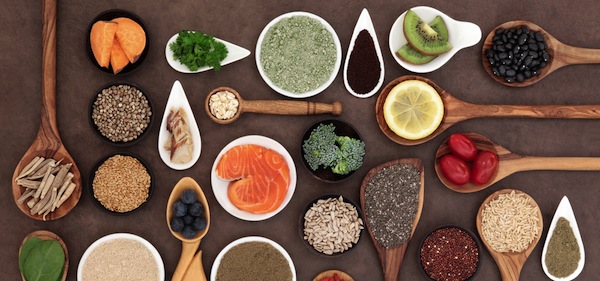Good nutrition is increasingly vital during older age, as it helps you to maintain your overall health and reduces your risk of age-related illnesses. Ensure your body gets these five important nutrients by making them a regular part of your diet:
Calcium
Calcium has many benefits for the body, although it’s primarily important for building and maintaining strong bones. During the ageing process, your bones lose mineral content faster, so the risk of developing brittle bones and fracture increases. It’s therefore vital to maintain the calcium in your diet, especially if you’re a post-menopausal woman.
What to eat: low-fat milk, yoghurt and cheese. Lesser known calcium-rich foods include kale, broccoli, and tinned sardines with bones.
Protein
Protein is vital to every cell in the body. It is responsible for hair and nail growth, maintaining and rebuilding muscles and regenerating skin and blood. Protein is an essential nutrient, such as calcium and fat. But unlike those two nutrients, the body does not store protein, so you need to continually replenish it.
What to eat: low-fat meat, poultry, fish, eggs, soy, legumes and limited amounts from nuts and low-fat dairy.
Magnesium
The body derives many benefits from magnesium, and chief among them are a fortified immune system, healthy heart and strong bones. Although many wholefoods contain magnesium, your body loses most of it during processing. Absorption of magnesium also becomes more difficult with age, and some medicines, such as diuretics, may also reduce magnesium absorption.
What to eat: fresh fruits, vegetables, nuts, whole grains, beans and seeds – particularly raw spinach, pumpkin seeds, soy beans, brown rice, avocado, bananas and even chocolate.
Fibre
Fibre promotes digestion by helping foods through the digestive tract. It can help prevent heart disease, diabetes, weight gain and some even cancers. There are two types of dietary fibre: soluble and insoluble. Soluble fibre absorbs water and becomes a thick substance that slows down digestion. It keeps you feeling full for longer, helping to prevent weight gain. Insoluble fibre has the opposite effect, speeding up the passage of food through the digestive tract, and giving your poo bulk.
What to eat: whole grains, whole fruits and vegetables, and legumes. Examples include oats, porridge, dark leafy greens, cabbage, celery, chickpeas, lentils, oat and rice bran, and nuts and seeds.
Fats
Believe it or not, fat is not the bad guy. It’s the type of fat that matters. Good fats support your general health and are essential for maintaining physical and brain health. Fats give you energy and help the body absorb vitamins A, D, E and K. When eaten with carbohydrates and protein, good fats can also help maintain weight. Good fats include monounsaturated and polyunsaturated fats. You can learn more about good and bad fats here.
What to eat: monounsaturated fats such as olive oil, peanut butter, macadamias and avocados. And polyunsaturated fats such as from nuts, seeds and omega-3-rich fatty fish. Fatty fish plays a large role in reducing the risk of Alzheimer’s disease, and salmon, tuna, sardines and mackerel are especially high in omega-3 fats.
Find out more at WebMD and Eatforhealth.gov.au
Related articles:
Turning 60? Here’s what you need to consider …
Eating well as you age
Seven foods dieticians won’t touch

